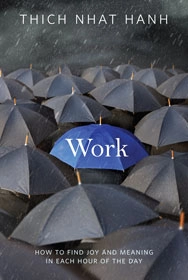I scored this a 5 / 5

I have recently finished reading a book called Work written by Thich Nhat Hanh and I wanted to share some thoughts on it.
Normally my reviews are for technical books, which I feel I am quite well placed to talk about, this review is going to be very different in that I am not in anyway skilful in the subjects of mindfulness and this is the first book I have read on the subject, to compensate this review is going to list some of my key takeaways. If you are interested in the takeaways I have personally gleaned from the book then it may be for you!
The title and subtitle give you a bit of a clue to the contents of the book, it helps to you try and find joy in every part of the day, especially in work. It tackles the thinking that you have a work life and a life life and they need to be in balance by suggesting that it is all your life and you can enjoy everything about it.
The main concept throughout the book, and from what I gather a core concept of Buddhism is to be mindful, what this means is no matter what the task focus 100% of your thought on that task, obvious applications of this would be speaking to someone or performing a work related task, but the book dedicates and entire section to talking about the joy you can get from brushing your teeth.
I really liked the wording in areas that talked about times when you perhaps didn’t act the way you should have, it is mentioned as being unskilful, I love this because it really brings home that literally everything in life is a skill and something we can improve upon.
I think if you get into the mindset of considering everything a skill then it is far easier to remove yourself and objectively look at how you could improve upon it. For example when I need to use regular expressions I know I am not skilful at this so would openly accept help, I would not (although I should) be as open to accepting help at say listening to someone because of course I know how to listen! I am 28!
Work manages to mix theory well with practical applications, for example it talks about the virtues of having a happy working environment, and then gives a written example of a form of contract a company could suggest employees stick by in order to achieve this.
The final chapter contains the most practical components, it is straight up titled “Thirty ways to reduce stress at work”! Here are two that I particularly liked;
Turn off your cell phone while in the car, on your way to work, or during breaks.
Practice not working or talking or eating at the same time. Do one of the other in order to be fully present for your food, for your colleagues, or for your work.
One thing I have noticed that is similar between what Thich Nhat Hanh mentioned a couple of times and what I have read in books such as “How to win friends and influence people” and “The 7 habits of highly successful people” is this notion of active listening, or as it is described in the book deep listening.
I found this book incredibly useful, I think it has a lot of practical application and I can see the sense in what it has talked about, am I going to become an overnight Buddhist? No, but I am going to try and be in the moment more in everything that I do.
